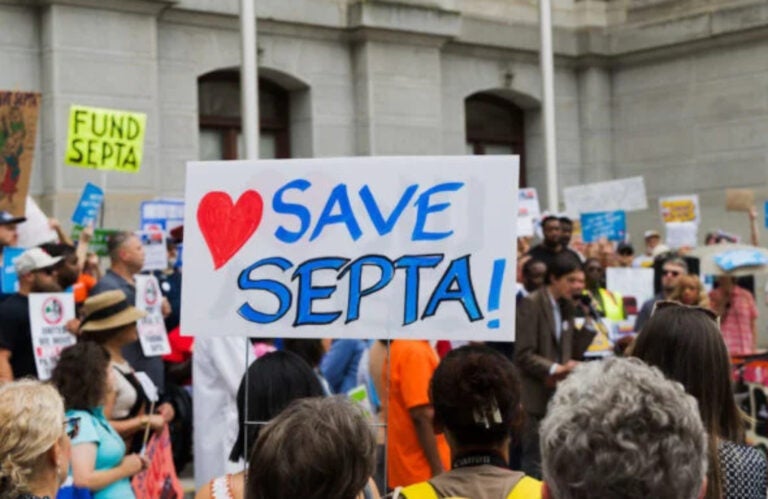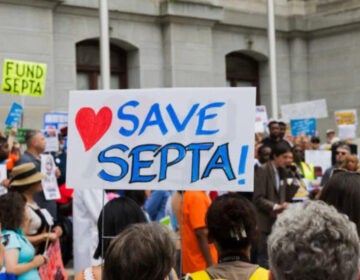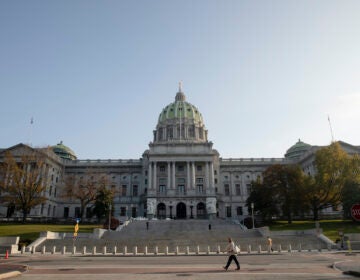SEPTA funding still in limbo despite Pennsylvania Senate approval of budget amendment
Democrats expressed frustration with the change, saying the money is already earmarked for necessary system and safety upgrades.

Transit riders at City Hall in Philadelphia, Aug. 6, 2025, demand SEPTA receive adequate funding ahead of service cuts. (Ryan Chi/WHYY)
From Philly and the Pa. suburbs to South Jersey and Delaware, what would you like WHYY News to cover? Let us know!
The Pennsylvania state Senate approved a budget Tuesday and advanced legislation that would fund SEPTA and other transportation infrastructure in the state for two years.
The plan, opposed by Democrats, now heads back to the state House of Representatives, where it’s expected to receive opposition in the Democratic-controlled chamber.
The GOP-backed amendment to House Bill 257, presented by state Sen. Joe Picozzi, R-Philadelphia, matches Gov. Josh Shapiro’s request for $292 million for transportation and infrastructure in the state, but rather than using sales tax revenue like Shapiro proposed, the money would come from the Public Transportation Trust Fund.
Picozzi, who proposed a plan to “increase SEPTA accountability” earlier this month, said the amendment would provide nearly $1.2 billion for transit and roads across the commonwealth and that it “protects taxpayers, improves the safety of our transit systems and implements new accountability measures.”
“More transit police on platforms and trains, tougher penalties for dealing drugs in stations, transparent reporting, so riders and taxpayers know how their money is being spent,” Picozzi said. “I understand the concerns of my colleagues, but let’s be very clear. We have enough existing resources to fund transit and infrastructure for two years without cutting back our plans or cutting funding for other programs.”
Democrats on the Senate floor Tuesday expressed frustration with the change, saying money from the Public Transportation Trust Fund is already earmarked for necessary system and safety upgrades. Republicans argue the fund’s remaining $1.1 billion is more than enough to cover the costs.
Sen. Nikil Saval, D-Philadelphia, called the proposal not only “unserious,” but also “dangerous” saying it “demonstrates a callous disregard for the lives and livelihoods of all Pennsylvanians who use public transit.”
“Taking money from the capital fund will make SEPTA and other transit agencies less safe, less secure and more difficult to run,” Saval said. “It will make it impossible for transit agencies like SEPTA to maintain their aging fleets, let alone implement changes to make the system faster, more reliable and more accessible to those it serves.”
In a statement, House Rep. and Democratic National Committee Vice Chair Malcolm Kenyatta said Republicans have “shown no hesitation in putting SEPTA on the chopping block to play their political games.”
“How can we expect workers to afford to keep food on the table and a roof over their heads, or students to show up to school, if there is no reliable transportation they can depend on? This isn’t about fiscal responsibility — we have the money — this is pure politics and millions of Pennsylvanians will pay the price,” Kenyatta said.
While the proposal could be enough to fend off a looming 20% reduction in service, it would do little to prevent expected fare increases, which under Picozzi’s proposal would still occur year-over-year.
SEPTA General Manager Scott Sauer said the agency appreciates “that the Senate seems genuinely motivated” to address the need for more state funding.
“I also acknowledge that in subsequent discussions with legislative staff this evening, there may be confusion about the proposed sources of funding to address the crisis we are facing,” Sauer said in a statement. “As a result, we expect to remain in close contact with all parties in this negotiation as we continue to await a solution that will provide adequate, sustainable funding for SEPTA’s future.”
On Monday, the Democrat-led state House of Representatives passed a funding bill for a fifth time, which included money for SEPTA. That legislation would increase the share of sales tax revenue used for both roads and mass transit funding in the state.
What SEPTA routes will be impacted by service cuts?
If both chambers don’t approve legislation by Thursday, Aug. 14, a 20% service cut will begin 10 days later, on Sunday, Aug. 24 — the day before the first day of school for Philadelphia public schools.
The cuts, described by SEPTA as a “death spiral,” will result in the immediate elimination of 32 bus routes and the shortening of 16 bus routes. There will also be a reduction in service to the 88 bus, Metro and Regional Rail lines and will discontinue all special service, including the Sports Express.
The bus routes that will be eliminated are the: 1, 8, 12, 19, 30, 31, 35, 47M, 50, 62, 73, 78, 80, 88, 89, 91, 106, 120, 126, 133, 150, 201, 204 (Sept. 27, 2025), 206, 311, 452, 461, 462, 476, 478, 484, BLVD DIR and MANN LOOP.
SEPTA fare increases, curfew and beyond: What other changes are on the table
Under the Senate proposal introduced Tuesday, fares would increase to account for the cost of inflation or “by the percentage increase in the consumer price index,” the bill states.
Without any funding, SEPTA says it will need to increase the base fare to $2.90, up from $2.50 beginning Sept. 1. In addition, a complete hiring freeze, including operators, would also go into effect.
By Jan. 1, 2026, more service cuts would be on the way, including a 9 p.m. curfew on all train service and the elimination of five Regional Rail routes and the Broad-Ridge Spur.

Get daily updates from WHYY News!
WHYY is your source for fact-based, in-depth journalism and information. As a nonprofit organization, we rely on financial support from readers like you. Please give today.





